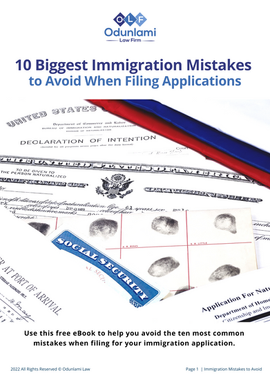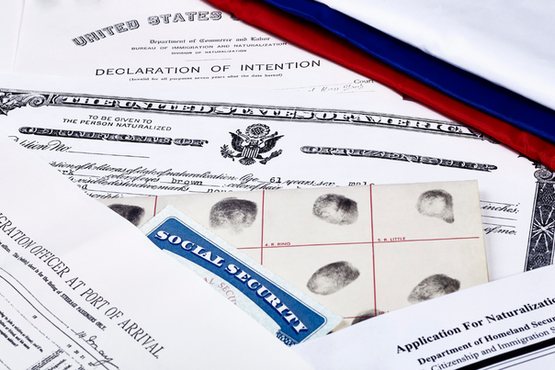It can be quite overwhelming when you are faced with going through the immigration process and all the forms you have to fill out. It is also of the utmost importance that you fill out every single form correctly, because, unfortunately, if you don’t then you risk your application being denied.
How to correctly file your immigration applications
To help you avoid making a mistake and risk your application being denied, here are ten mistakes that people sometimes make that either cause a delay in their application or cause their application to be denied. Knowing these mistakes can help you to file your immigration application the correct way.
1. Prepare your immigration petition correctly
Make sure to follow all the directions as they are written. For example, when filling out your paperwork most immigration agencies require you to fill out your paperwork in black ink. So make sure you use a good black ink pen. It will state on each document where you have to sign and where your spouse/relative will have to sign. So you need to also make sure you are signing the document in the correct place with your name, the correct date, and year.
2. Submitting your immigration application with the correct fee
Make sure you understand the fees for each document. You should not write a check to combine each application fee. If you have to file more than one application, you will want to write a separate check for each application you are filing. You also need to make sure you are writing each check to the correct department. Do not abbreviate names and each department name should be spelled correctly. Put the name of the immigration application form in the memo. For example, I-130.
*TIP: Label your passport photos
Things sometimes get lost. When you are including any passport photos along with your immigration application. It is a good idea to write your full name, case number (if you have one), and date of birth on the back of all your passport photos.
3. Provide the correct information on all your immigration applications
For example, on an immigration application, you might be required to fill out every place you have worked or lived in for the last five years. Do not guess. Take the time to really figure out the dates, specific addresses, and the correct names of places.
4. Mail your immigration application to the correct address
Where you live determines where you have to mail your immigration application form. Again, do not guess. Make sure you go to the USCIS website and double-check where to send your application. Addresses on the website do periodically change. So somewhere you sent a form before might not be the correct address the next time.
You should also make sure that you are filing the most recent immigration application form. When you are ready to file, print directly from the USCIS website and complete your application.
5. All required documents must be translated into English
For any legal document including birth certificates, marriage certificates, death certificates, and divorce decrees, you must have all the documents translated into English. It is also important that the person who is translating all your documents is certified to translate documents. You might want to also hire a certified translator so that as you go through the translating of all your legal documents, things don’t get miscommunicated.
6. You must file all required legal documents
Along with your immigration application make sure you have included every legal document. Don’t leave out any documents. Make sure you receive a correct list from the USCIS website of every legal document you need to send in with your application.
7. Notify the USCIS of your change of address
During your immigration process if you end up moving you must notify the USCIS of your change of address. This is important for a few reasons. 1. It is the law to notify the USCIS. 2. If they send you any letters or the USCIS is requesting additional documentation, you might not receive it and your case could be dismissed.
8. Make sure to write out your full given name
This might sound like common sense but some people go by a different name or nickname than their given name. Whichever name is on your birth certificate or passport is the one you have to use on all immigration applications, unless you have done a legal name change. If so, you must include the legal documents proving the change of name.
9. You must disclose any prior infractions
Even if your prior infraction was dismissed or it was something small you must disclose any prior infractions on your immigration applications.
10. Prepare for your immigration interviews
It is so important that you take the time to completely prepare for any of your immigration interviews, especially your marriage interview. It is really hard to remember everything about your spouse and so it is important to practice with each other and make sure you refresh yourself with things/events from the past, and any recent changes that have happened in your relationship.
There are plenty of online resources that can help you with your immigration interview. We also have resources to help you prepare;
13 Tips to Help You Prepare for Your Immigration Marriage Interview
The Most Common Question Asked During Your Fiancé Visa Interview
You need to make sure that you bring copies of all your legal documents to your immigration interviews.
Watch the video with immigration attorney, Ifeoma Odunlami as she discusses the Ten Biggest Immigration Mistakes to Avoid When Filing Applications.
Subscribe to download the free eBook
Ten Biggest Immigration Mistakes to Avoid When Filing Applications

Subscribe to our newsletter
If you are an intending immigrant and have been a victim of domestic abuse or if you have questions about the immigration process please contact the Odunlami Law Firm at 973-993-1900 or email us at iao@odunlamilaw.com.
We can help you will your immigration needs.
If you wish to immigrate or want to help bring a family member to the United States, the Odunlami Law Firm can help. If you are facing deportation or removal for any reason, you need our help. You may contact the law office for more information or to schedule an appointment.
Areas of Immigration Law:
Naturalization (Citizenship) Application
Immigrant Relative Petitions
Fiancé Visa Applications
Adjustment of Status and Consular Processing
Criminal Consequences and Deportation Defense
Violence Against Women Act (VAWA) Application
Special Immigrant Juvenile Status
Green Card Renewals
Temporary Work Visas
Temporary Protected Status
Deferred Action for Childhood Arrivals
Waivers



